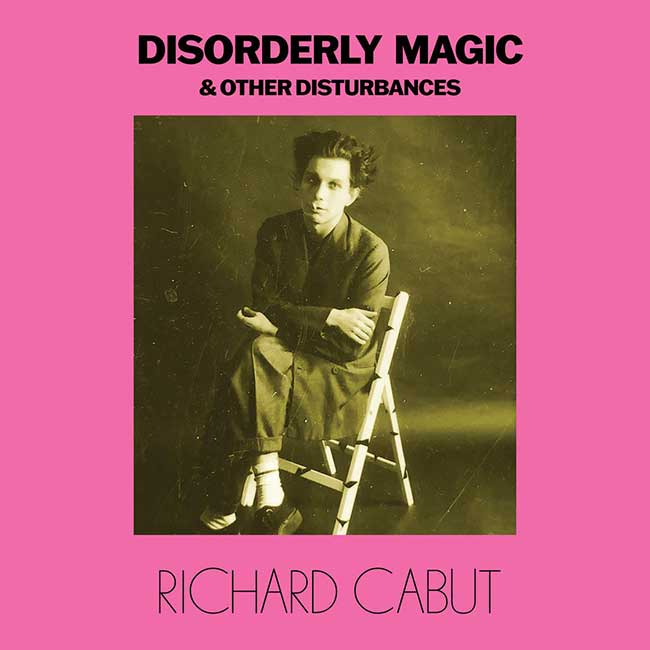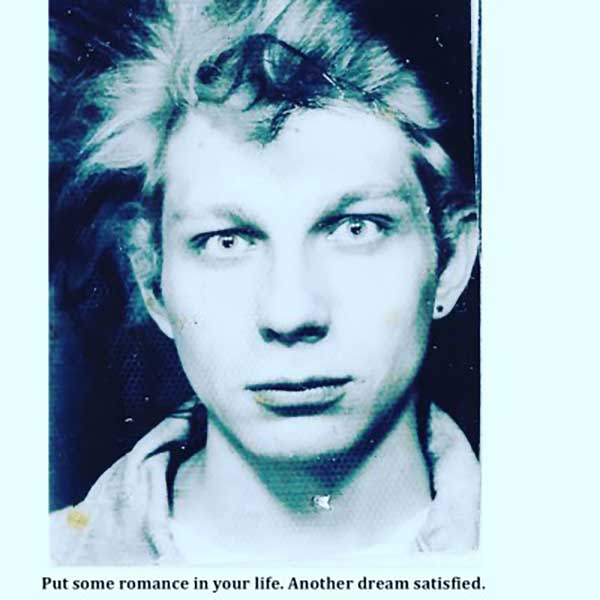
Many years ago, I made a mental note not to review poetry, why make a bigger fool of myself? The Fool is of course a transitional archetype. When asked to review the cassette of Richard Cabut’s Disorderly Magic I should have resisted; I don’t even have a working cassette player – that could be resolved. A punk poet, most of my collection of punk rock was on cassette, much of it badly recorded at concerts, unplayable by the time I left London more than a decade ago. That somebody was still using the cassette as a medium was enticing in itself. Of course, I did not have the book, could not locate it in any of the small independent book shops close by me. But perhaps that’s the point; poetry is an aural medium. Listen to it; take it for its word.
Richard Cabut’s Disorderly Magic immediately became a best seller; the cassette is the chosen medium. Although I read a lot of poetry, aloud, fleeting references can elude you. Without the reference of the printed word, it is best to dwell on the familiar and see where that takes you.
Cabut opens reflecting on a screening of Andy Warhol’s Chelsea Girls in the Scala cinema, King’s Cross. Was this some kind of golden age for the punk imagination; Lou Reed, Nico, the Factory and all that. The Chelsea Hotel, 222 West 23rd Street, Manhattan, had seen better days by the time of Warhol’s film. Dylan Thomas to Bob Dylan, what would become a glittering literati passed through and with them, as urban decay set in, drug use, prostitution and who knows what else? It now only exists in name and memory; each in conflict with the other. At 3½ hours and each screening unique as the dark and light of the twin projections don’t quite synchronise, years on, I can’t recall how closely Cabut follows the dialogue, but his poetry takes on the proportions of the works of Blake or Swinburne. He cannot linger between the frames of the film. Soon we are out in the streets, not just King’s Cross, his Chelsea Girls roam the metropolis, the punk femmes of his youth. The Portobello Hotel was not the Chelsea Hotel, though it might have liked to have been – neither are what they once were; London is not New York. One can recall his Chelsea Girls, more alive than Warhol could make them out to be. They say there is no poetry to be extracted from my life, yet here we are, in print somewhere and on cassette, poetry revealing personality disorder. Cabut used the term ‘Disorderly Magic’ in his memoir of Jordan¹, what better example could there be?
Cabut’s urban landscapes seem to revel in squalor; the Aylesbury and White City Estates are iconic, I always sought to make the best of them, though not a journey I ever took, many of the streets betwixt are familiar and full of wonders if you really look. Can the flaneur travel by taxi?
Sans text, does Cabut stray from ‘angel’ to the Polish ‘anioł’ in his account of his mother’s journey? It sounds like it (I later discover this was the case, reciprocating). She was one of two million Poles deported to Siberia on 10th February 1940 when Russia invaded eastern Poland as part of its pact with Nazi Germany; Socialism in action, trust nobody who thinks they have the solution. Her village is now within Ukraine. Poland was part of the Soviet empire from 1944 to 1993 when the last troops withdrew. After a despairing journey Cabut’s mother eventually settled in Dunstable, Bedfordshire, where his journey (almost) ends in Ghost Music, his family predeceasing him, personal resurrection apart. Yet the room of his first memory cannot contain him, he is off to Godard’s Alphaville, down paths traced by Borges and Éluard, a poet first. Cabut’s poetry is best when it is most personal.
So, we have travelled down streets of alienation, people living in cities to be alone; in presenting his work through the spoken word does Cabut’s poetry seek to escape or celebrate this? What would I say to the poet? Be concise; even as performance poetry your pieces are generally to long; were I to read them, would they hold my attention? Yes, I think, where they are most personal, but would the poem’s free verse hold me where it digresses?
Cabut’s voice is underlaid by a continuo of ‘ambient dark jazz sonic landscapes’, chosen himself and carefully mixed to enhance, not over-power (the hand of Fritz Catlin?). Paul T Kirk (Akatombo) provides the backing to Chelsea Girls; Necessary Animals to Disorderly Magic, which was previously known as Unkempt Magic; Simon Beesley, of June Brides, In The City; Deptford’s Band Of Holy Joy, 10th Floor; Keith Rodway, Anioł; and AKA (Anthony Moore, Keith Rodway & Amanda Thompson) to Ghost Music. A veritable cast. If you are like Colin from Froth on the Daydream, you’ll be needing this… at least once.
How do you acquire this gem? Putting the question to Google, Dash the Henge, in Brixton came up https://dashthehengestore.com/ – the Disorderly Magic cassette was launched there on 22nd May… you probably need to visit the store anyway. Otherwise Far West Press is the main distributor – they ship worldwide from NY.
The book, incidentally, is published by Far West Press, isbn 979898506755 – many more poems than on the cassette, but Chelsea Girls are greedy and take up a lot of space. You don’t have to use bibliomancy to know that pataphysics is the only science.
Stewart Rayment
¹ International Times, 9.4.2022 – Pamela Rooke, aka Jordan (23 June 1955 – 3 April 2022)
Disoedrly Magic by Richard Cabut is available on Spotify or Apple Books. For more info on everything Richard Cabut, click here https://linktr.ee/richardcabut?utm_source=linktree_profile_share<sid=bf2d7c6f-fb6b-45eb-bd9c-283af2b1e9ed

Stewart Rayment
.
